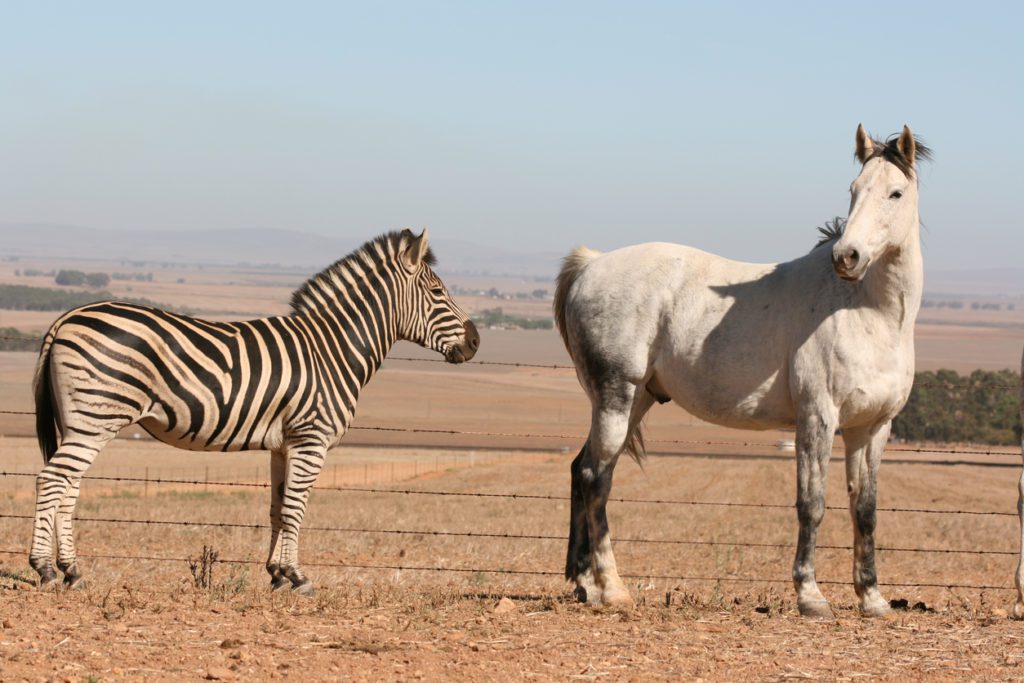If I designed school curricula, students would be given an opportunity to learn the systems and practices of successful people. A young person with a base knowledge of how to be successful would more easily grasp new ideas and concepts to achieve success in the “real world.”
Basic knowledge is easily connected to other concepts and knowledge. “New” knowledge becomes not so new. Basic or ordinary knowledge, once combined, becomes extraordinary knowledge.
As one’s base of knowledge grows, he will learn new concepts faster. They’ll have a broader application of basic knowledge that existed in their head before exponential learning began.
Knowledge applied in the “real world” is where success begins.
Are You Smarter than a 3-Year Old?
Imagine you took your 3-year old daughter on safari in Africa, and it was the first time she ever laid eyes on a zebra. She might point and say, “Mommy/Daddy, what’s that?”
You might say, “That’s a zebra. It’s like a pony, but with black and white stripes.” The little girl now has new knowledge thanks to her existing knowledge (she has a My Little Pony at home).
When the little girl returns home, she asks Mom if she can paint her My Little Pony with black and white stripes. She’ll call it my little zebra and take it to “show-n-tell.”
-

.
The little girl wins a first-place ribbon for creativity! At just three years old, she quickly learned a new concept by connecting “new” knowledge (of a zebra) to existing knowledge (of a pony). Most importantly, she used a broader application of her basic knowledge to achieve success.
Combined Knowledge
I made up the story about My Little Pony as I was typing this article. No need to stop and think. It was easy to do because I once spent several minutes creating a similar story about the time I watched a leopard hunt impalas in Zambia.
But that’s not all. I wrote the My Little Pony story on Christmas morning. I once had a girlfriend whose niece got a My Little Pony for Christmas. Then I thought about my own niece because she was a smart enough 3-year old to win first place at show-n-tell (I might’ve otherwise made the girl 5 years old).
My basic knowledge was combined and applied to create a story. Perhaps not extraordinary, but nonetheless helps to illustrate my point: New ideas come faster as your base of knowledge grows. I will achieve success in the real world when one reader is inspired to accelerate their own learning.
The Feynman Technique
In order to grasp new concepts and ideas that will lead to success in the real world, I encourage young people to learn The Feynman Technique.
Richard Feynman was a Nobel Prize-winning theoretical physicist aptly nicknamed “The Great Explainer.” He devised a simple process for learning anything called The Feynman Technique, which is as follows:
- Choose a concept
- Teach it to a child
- Identify gaps and go back to the source material
- Review and simplify
This method gives the student a good understanding, while also allowing for the ability to easily pinpoint problem areas.
You don’t need to know hundreds of concepts to achieve success. There are fundamentals that have withstood the test of time that’ll suffice.
You will be mocked for learning basics—it’s almost an immutable law of simplicity. I had a friend who got in my car 13 years ago and leaned over to see what was in my CD player. He found Goals by Brian Tracy. He laughed at me. I laughed at myself.
Another time, a guy mocked me for listening to The Power of Positive Thinking by Norman Vincent Peale. One of them may read this when his shift ends at Chili’s; the other doesn’t read.
My point is you must be willing to withstand ridicule as you accumulate basic knowledge. Learn to laugh at yourself. Most importantly, remain open to learning and develop your intellectual humility.
Charlie Munger
“The more basic knowledge you have, the less new knowledge you have to get.”
Intellectual Humility
Intellectual humility is a character trait related to open-mindedness and a sense of one’s own fallibility. One who lacks intellectual humility is prone to intellectual arrogance, closed-mindedness, and over-confidence in one’s own opinions.
In 2012, three psychologists: Richard West, Russell Meserve, and Keith Stanovich tested blind-spot bias – an irrationality where people are better at recognizing biased reasoning in others but are terrible at recognizing bias in themselves. Their research showed that blind-spot bias is more pronounced in the smartest people.
“Knowing what you don’t know is more useful than being brilliant.”
Charlie Munger
The blind-spot bias findings are contrary to popular belief that the smarter you are, the less susceptible you are to your own blind-spots and disinformation (Fake News!). It’s common in America to think country bumpkins lack the intellectual capacity to spot those with an agenda. Au contraire…
In Thinking in Bets, Annie Duke writes, “Surprisingly, being smart can actually make bias worse … the smarter you are, the better you are at constructing a narrative that supports your beliefs, rationalizing and framing the data to fit your argument or point of view.”
Charlie Munger
“The first principle is that you must not fool yourself – and you are the easiest person to fool.”
I Think Therefore I Am [Better than Average]
Brilliant thinkers like Munger, Feynman, or even Duke, tend to be humble. Most of the rest of us are susceptible to overestimating our abilities.
One hundred psychology studies were done in 1999 to determine just how bad we are at judging ourselves. The results showed 88% of drivers rate themselves as having better than average driving skills. Other areas where our self-assessments violate the laws of math include our health, leadership skills and ethics.
Not to be outdone, those most vulnerable to self-delusion in estimating their abilities are people who are measurably poor in logical reasoning, grammar, financial knowledge, math and emotional intelligence. The Dunning-Kruger Effect describes the cognitive bias of illusory superiority, which comes from the inability of low-ability people to recognize their lack of ability.
Low-ability people lack the self-awareness of metacognition (knowledge about your own knowledge); therefore, low-ability people cannot objectively evaluate their actual competence or incompetence. Futhermore, if they make a mistake, they’re likely to draw the wrong conclusions.
If you’re thinking stupid people don’t know they’re stupid, you’re a savage thinker.
Successful Finish
My formula for success begins with basic knowledge of various topics; a deliberate effort toward mastering fundamentals.
As a veritable jack of ‘some’ trades, master of none, here’s a list of my above-average skills:
- Driving
- Good health
- Leaderships skills
The list above proves I’m funny. No seriously, here is a list of basic knowledge & skills I’ve acquired and combined, which have contributed to successes I have had:
- Public Speaking / Sales / Persuasion
- Basic Math / Basic Accounting / Personal Finance
- Business Writing / Grammar
- Coachable / Open to Learning
- Mentoring / Leadership
- Emotional Intelligence / Human Nature / Psychology
Here’s a list of how I developed those skills:
- Became a Student of Items Listed Above
- Kept a Journal / Autodidactisism (self-learner)
- No Fear of Embarrassment / Handle Rejection Well / Take Nothing Personally
- Asked Questions / Asked for Help
- Developed a Supreme Confidence in Myself
- Obsessively Vetted People
- Minimized Exposure to Negative People
- Service to Others
- Exercised / Ate Clean / Maximized Personal Energy
- Took a Keen Interest in People & Places
- Meditation / Prayed for Wisdom
- Took a Long-Term Perspective
My list is a work in progress, as we all are.
My personal recipes for a life well-lived can be found here. It’s categorized by: personal growth, mental strength, optimizing happiness, obtaining financial freedom.
I challenge you to broaden your base of knowledge. Success will follow.




Definitely interesting concepts here. I try to instill these basics in my kids-love God,love your neighbor, have humility, love to learn,, stay curious, live intentionally & explore the world around you.
The getting over being embarrassed and rejection I think are the hardest ones to learn. You get better at those as you age because you finally start to realize it really doesn’t matter what people think.
Thanks again for a thought provoking blog. Happy New Year!!
Thanks, Alison! Love it – might steal your list someday haha.
You’re right, getting over rejection is hard. I’ve been lucky on that front because I’ve been rejected so much, for so long. I have all these lil’ life shortcuts I began developing at an early age, such as, “Rejection is God’s protection,” or “When someone shows you who they are, believe them.” Personal philosophies and rules to live by have served me well. It’s a good life.. happy New Year!